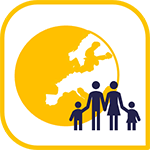
Section 4.14. Content of protection
Recognised beneficiaries of international protection are granted certain rights and obligations, as outlined by the Geneva Convention. The recast Qualification Directive outlines the content of international protection to harmonise what a recognised beneficiary can expect under national policies. Its provisions shape the integration of beneficiaries of international protection through standards on residence permits, employment, education, social welfare and health care. Relevant articles of the directive also outline the criteria for the cessation and revocation of refugee status.
2021 marked the first year of implementation of the EU Action Plan on Integration and Inclusion 2021-2027. The key actions included:1080
- A new partnership between the European Commission and the Committee of the Regions for improved cooperation and support on the integration of newcomers to cities, regions and rural areas;1081
- The 6th European Migration Forum which addressed the situation of migrants, including beneficiaries of international protection, during the COVID-19 pandemic and explored ways in which migrants can contribute to the EU’s economic and social recovery;1082
- A new early childhood education and care toolkit, providing support to young children with additional needs, such as migrant and refugee children.1083
Several Member States updated their integration strategies in 2020 to match the EU Action Plan, so efforts in 2021 focused on implementing these new strategies. As a result, many legislative changes related to integration entered into force in 2021 or the beginning of 2022, while others were in the pipeline.
At the country level, discussions on national forms of protection and regularisation measures came to the forefront in 2021, due in part to COVID-19 travel restrictions and the reduced possibility of implementing returns. Countries also addressed the increased use of status reviews of cessation and revocation grounds in previous years. Immediate protection was granted on humanitarian grounds, for example for Afghan evacuees and, more recently, for the first wave of persons fleeing from Ukraine (see Section 2). Cases were referred to the courts frequently throughout 2021 to provide guidance on family reunification.
The number of studies from various stakeholders – national authorities, research institutes, think tanks, academia and civil society organisations – evaluating the efficiency and impact of national integration strategies continued to grow, and the reports provided useful insights to further improve integration approaches. While practical barriers persisted in many aspects of everyday life for beneficiaries of international protection, national authorities, often together with local authorities and civil society organisations, undertook initiatives to overcome these challenges, especially in the field of children’s education.
4.14.4. Support for integration: Orientation, education, employment, health and welfare
References do not display when edit the page
- 1080European Website on Integration. (2021, November 24). One year on: EU Action Plan on Integration and Inclusion 2021-2027. https://ec.europa.eu/migrant-integration/news/one-year-eu-action-plan-integration-and-inclusion-2021-2027_en
- 1081European Website on Integration. (2020, December 10). New European Commission and Committee of the Regions partnership on integration. https://ec.europa.eu/migrant-integration/news/new-european-commission-and-committee-regions-partnership-integration_en
- 1082European Commission. (2021, November 4). The 6th European Migration Forum highlighted migrants’ contribution to the EU’s economic and social recovery post-pandemic. https://ec.europa.eu/home-affairs/news/6th-european-migration-forum-highlighted-migrants-contribution-eus-economic-and-social-recovery-post-2021-11-04_en
- 1083European Commission. (December 2020). Toolkit for inclusive early childhood education and care: Providing high quality education and care to all young children. https://op.europa.eu/en/publication-detail/-/publication/4c526047-6f3c-11eb-aeb5-01aa75ed71a1





